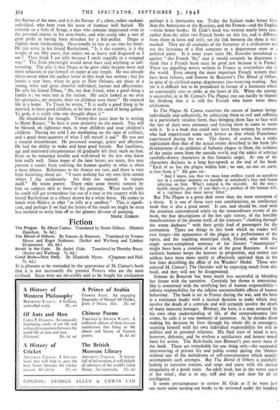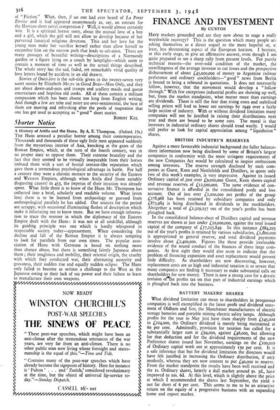Fiction
Strait is the Gate. By Andre Gide. Translated by Dorothy Bussy. (Seeker and Warburg. 7s. 6d.) IT is pleasant to be reminded by the appearance of M. Camus's book that it is not necessarily the greatest Powers who are the most civilised. Since wars are invariably said to be fought for civilisation perhaps it is instructive too. Today the Italians make better films than the Americans or the Russians and the French—and the English —write better books, M. Gide's book was written nearly forty years earlier than the other two French books on this list, and is different from them in form and style, yet the link between the three is very marked. They are all examples of the literature of a civilisation and not the literature of a- film company or a department store or a political party. It is some years since Mr. Koestler. inoculated us against " the• French 'flu," and it would certainly be disastrous to think that a French book must be good just because it is French. There are appalling novels written in France as everywhere else in the world. Even among the more important French writers there have been failures, and Simone de Beauvoir's The Blood of Others, in spite of its civilised stamp, degenerates into wearying reading. And yet it is difficult not to be prejudiced in favour of a literature which so consistently tries to strike at the heart of life. When the attempt is successful, as in M. Camus's The Plague, one can hardly be blamed for thinking that it is still the French who know most about civilisation.
In The Plague M. Camus examines the nature of human beings, individually and collectively, by subjecting them to evil and suffering in a particularly virulent form, thus bringing them face to face with the fact of their own existence and forcing them to come to terms with it. It is a book that could only have been written by someone who had experienced some such horror as that which Frenchmen experienced during the war. The theme, of course, has a wider application than that of the actual events described in the book (the development of an epidemic of bubonic plague in Oran, the isolation of the entire town from the outside world, and the antics of selected carefully-drawn characters in this fantastic siege). As one of the characters declares in a long key-speech at the end of the book, "Each of us has the plague within him ; no one, no one on earth, is free from it." He goes on:
"And I know, too, that we must keep endless watch on ourselves lest in a careless moment we breathe in somebody's face and fasten infection on him. What's natural is the microbe. All the rest— health, integrity, purity (if you like)—is a product of the human will, of a vigilance that must never falter."
But The Plague is a great deal more than the mere statement of a thesis. It is one of those very rare combinations, an intellectual book that is also a good novel. It can, and should be, read with the attention concentrated solely on the extraordinary events of the book, the fine descriptions of the hot ugly streets, of the horrible Manifestations of the disease itself, of the tramcars "clanking through the warm darkness" with their grisly load of passengers for the crematoria. Ttiere are things in this book which no reader will ever forget—the appearance of the plague at a performance of the opera, and the touching municipal clerk, Grand, who with the single never-completed sentence of his literary " masterpiece " might have been a creation of one of the great Russians. A nice sardonic humour keeps the horrors in proportion, and society can seldom have been more neatly or effectively satirised than in the few lines describing the affair of the Warders' Medal. Those who enjoyed M. Camus's The Outsider will be expecting much from this book, and they will not be disappointed.
Simone de Beauvoir has been much less successful in blending her theme with the narrative. Certainly her theme is interesting. She is concerned with the terrifying fact of human responsibility— infinite responsibility for the infinite uncontrollable effects of human behaviour. The book is set in France during the war, and the hero is a resistance leader with a tactical decision to make which may involve the death of a comrade and will certainly involve the death of many innocent hostages. Blomart, the hero, is a man tortured by his own clear understanding of life, of the remnrselessness (the crime, he calls it at one moment) of existence. As he shrinks from making his decision he lives through his whole life in retrospect, taunting himself with his own individual responsibility for evil in politics and in personal relations. His final state of mind is not, however, defeatist, and he evolves a satisfactory and honest moral basis for action. The flash-backs into Blomart's past cover most of the book. These are remarkable for one thing only—the successful interweaving of private life and public events during the 'thirties without any of the melodrama or self-consciousness which usually accompanies such attempts. But The Blood of Others is painfully lacking in narrative tension, and stops and starts with the jarring irregularity of a goods train. An adult book, but in the worst sense of the word ; that is to say, stiff and dry and slow for all its intelligence.
It seems presumptuous to review M. Gide as if he were just one more name turning out books to be reviewed under the heading
of "Fiction." What, then, if no one had ever heard of La Porte Etroite and it had appeared anonymously as, say, an entrant for the Horizon short novel competition ? Well, it would almost certainly win. It is a spiritual.horror story, about the mutual love of a boy and a girl, which the girl will not allow to develop because of her perverted fanatical religious devotion. This and her love for the young man make her sacrifice herself rather than allow herself to encumber him on the narrow path that leads to salvation. There are many passages of beautiful writing—descriptions of a Normandy garden or a figure lying on a couch by lamplight—which seem to contain a moment of time as well as the actual things described. The whole story has the sad, faded, yet remarkably vivid quality of love letters found by accident in an old drawer.
Stories of Outsiders is the sub-title given to the twenty-seven very snort stories by Elizabeth Myrs in Good Beds—Men On/y, and they are about down-and-outs and tramps and scullery maids and queue entertainers and hopeless old cooks. All of them contain a militant compassion which has been absent too long from English writing. And though a few are trite and more are over-sentimental, the best of them are moving and refreshing after the pools of stagnation that one has got used to accepting as " good " short stories.
ROBERT KEE.



































 Previous page
Previous page